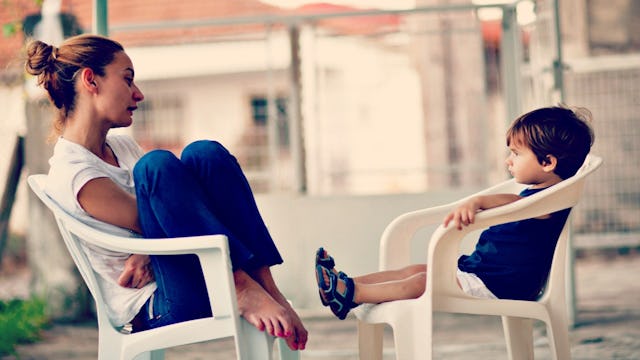It's Never Too Early To Start Talking To Your Kids About Sex

My sons know where to find my stash of condoms, and they know they’re welcome to dip into it freely – once they can reach it without a stepstool, that is.
Right now they recoil at the idea that they’ll ever want to be intimate with anyone in that way (“Gross, Mom!”) but one of these days, the opportunity will present itself and they suddenly won’t find it so “gross” any more. And when it does – when they turn from my innocent babies into sperm-wielding teens capable of making innocent babies – they will be prepared. I know, because I’ve been preparing them since they were toddlers.
I’m sure to some, it seems extreme. When we think of talking to our kids about sex, we feel like we’re going to somehow rob them of their innocence or purity, or that it’s encouraging them to be sexual. But here’s the thing: sexual development begins during childhood. And it’s not going to diminish as time goes on. As parents, we can either take away the taboo of talking about it, so they’re more likely to ask us the questions they need to ask – or we can make a natural development feel shameful, so they’re more likely to either experiment dangerously with it on their own or seek information from someone who doesn’t have any. Either way, they start asking the questions early.
It’s hard to know where to begin, or how much information to divulge, and every kid is different. My oldest, who takes things extremely literally and spent his early childhood preferring medical documentaries over Disney movies, wanted to know at about age four exactly how babies were made. Not just a vague explanation, but a technical play-by-play (if it helps, people are always comparing him to Sheldon from Big Bang Theory).
So when it was his younger brother’s turn to ask, I had what I felt was a decent and age-appropriate description at the ready. But based on his utter confusion after I launched into it, I learned that he probably would have been happy with a much simpler explanation. Oops. From there on out, when my last two asked me how babies are made, I answered with, “Well, how do you think they’re made?” Then, when they told me, I was able to get a good grasp on what they already understand and go from there.
I always start very young, with the very basics: teaching them the proper names for their genitalia and familiarizing them with the term. (With four sons, the word “penis” feels as natural to my vocabulary as the word “nose.”)
No, this isn’t about sex, but its purpose is to let them know that their genitals are nothing to be so ashamed of that we’re too embarrassed to even call it what it is. I teach them boundaries, that no one should ever touch them where their underwear would cover – or anywhere that makes them feel uncomfortable, for that matter – and that if it happens, they should let me or their dad know. This is not only important for them to remember, it lets them know from a very early age that (a) physical boundaries are a thing, and (b) I’m a safe place to land if they have questions or concerns.
As they get older, I try to capitalize on teachable moments. An episode of 16 and Pregnant that I was watching (don’t judge) opened up a dialogue about using condoms, and I was able to explain to my sons in a simplified way how condoms work, and told them that I absolutely expect them to protect themselves and their partners because that’s their responsibility. They may not be ready at this point, but they’re definitely listening, and I’d rather they have the information they need before they head cluelessly into their first sexual encounters.
The hardest part about having talks with your kids about sex is the awkwardness you’ll feel inside as you try to pretend you’re not feeling awkward at all. But trust me, even that goes away (or at least doesn’t sting as much once you’re accustomed to it; like anything else, it gets easier the more you do it). I just remind myself that keeping them ignorant does no one any favors.
By teaching my kids young, I’m laying the groundwork for the more complicated sexual subjects I know we’ll need to talk about when they’re teens. I’m firmly establishing myself as their (open, approachable, non-judgmental) source for accurate facts; they’ll know that when they have questions, I’ll have answers, and they don’t have to be afraid to look to me for guidance. Because I know that if I don’t talk to my kids about sex, somebody else will … likely somebody whose parents didn’t talk to them about the responsibility and weight attached to the act.
I cringe at the thought of sending my kids off to college without proper knowledge of how to change sheets or whip up a cheap meal – and those are minor things. How could I ever send them into the world without the knowledge of how sex works, and what their sexual rights and responsibilities are? This is major stuff. A sexual encounter can literally change someone’s entire life. In a few moments that begin with sex, a person can be traumatized or form an emotional bond or contract a disease or create an unplanned pregnancy.
If I’m teaching my kids how to cook on a budget, but not how to keep themselves and their sexual partners physically and emotionally safe, then I’m not doing my job.
This article was originally published on